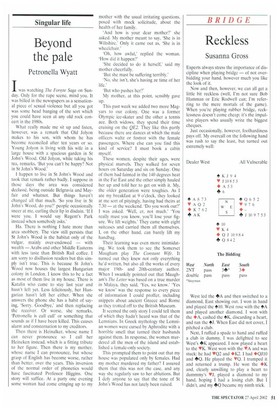Singular life
Beyond the pale
Petronella Wyatt
Iwas watching The Forsyte Saga on Sunday. Only for the rape scene, mind you. It was billed in the newspapers as a sensational piece of sexual violence but all you got was some head banging of the sort which you could have seen at any old rock concert in the 1980s.
What really made me sit up and listen, however, was a remark that Old Jolyon makes to his son, with whom he has become reconciled after ten years or so. Young Jolyon is living with his wife in a large house with a spacious garden in St John's Wood. Old Jolyon, while taking his tea, remarks, But you can't be happy? Not in St John's Wood,' I happen to live in St John's Wood and took that remark rather badly. I suppose in those days the area was considered declasse, being outside Belgravia and Mayfair and whatnot. But things haven't changed all that much. 'So you live in St John's Wood, do you?' people occasionally sneer at me, curling their lip in disdain. 'If I were you. I would say Regent's Park instead when somebody asks.'
Ha. There is nothing I hate more than area snobbery. The view still persists that St John's Wood is the habitat only of the vulgar, mainly over-endowed — with wealth — Arabs and other Middle Easterns with less taste than British Rail coffee. I am sorry to disillusion readers but this simply isn't true. This is because St John's Wood now houses the largest Hungarian colony in London. I know this to be a fact as most of them live in my house. There is Katalin who came to stay last year and hasn't left yet. Less felicitously, her Hungarian hasn't left her either. When she answers the phone she has a habit of saying, 'Sorry. Goodbye,' and then replacing the receiver. Or worse, she remarks, 'Petronella is cull cull' or something that sounds as if I have been killed. This causes alarm and consternation to my creditors.
Then there is Heinalker, whose name I can never pronounce so I call her Heineken instead, which is a fitting tribute to her figure. Then there is my mother, whose name I can pronounce, but whose grasp of English has become worse, rather than better, over the years. This inversion of the normal order of phonetics would have fascinated Professor Higgins. One story will suffice. At a party one evening some woman had come cringing up to my mother with the usual irritating questions, posed with mock solicitude, about the health of her family.
'And how is your dear mother?' she asked. My mother meant to say, 'She is in Wiltshire.' Only it came out as, 'She is in wheelchair.'
'Oh, how awful,' replied the woman. 'How did it happen?'
`She decided to do it herself,' said my mother cheerfully.
'But she must be suffering terribly.'
`No, she isn't, she's having ze time of her life.'
`But who pushes her?'
My mother, at this point, sensibly gave up.
This past week we added two more Magyars to our colony. One was a former Olympic ice-skater and the other a tennis ace. Both widows, they spend their time cruising on the QE2. They like this partly because there are dances at which the male officers waltz or foxtrot with the female passengers. Where else can you find this kind of service? I must book a cabin myself.
These women, despite their ages, were physical marvels. They walked for seven hours on Saturday and six on Sunday. One of them had fainted in the 140 degrees heat in the Far East and the other simply hauled her up and told her to get on with it. My, the older generation were toughies. As I ate my breakfast at 9 o'clock, they looked at me sort of pityingly, having had theirs at 7.30 — at the weekend. `Do you work out?' I was asked. `Well, er, not much.' You really must you know, you'll lose your figure. We lift weights.' They came with eight suitcases and carried them all themselves. I, on the other hand, can barely lift my handbag.
Their learning was even more intimidating. We took them to see the Somerset Maugham play The Constant Wife. It turned out they knew not only everything he'd written, but also all the works of every major 19thand 20th-century author. When I swankily pointed out that Maugham's The Letter was based on a true murder in Malaya, they said, 'Yes, we know.' Yes we know' was the response to every piece of information I could proffer, including snippets about ancient Greece and Rome as they trotted off to the British Museum.
It seemed the only story I could tell them of which they hadn't heard was that of the Lemnians. In Greek mythology the Lemnian women were cursed by Aphrodite with a horrible smell that turned their husbands against them. In response, the women murdered all the men of the island and established a female-only society.
This prompted them to point out that my house was populated only by females. Had my mother murdered my father? I assured them that this was not the case, and any way she regularly saw to her ablutions. But I defy anyone to say that the tone of St John's Wood has not lately been raised.


































































 Previous page
Previous page